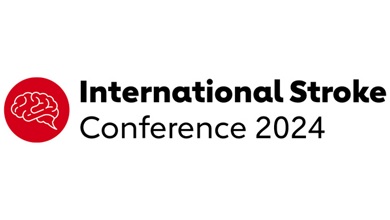
American Stroke Association International Stroke Conference 2024, abstract WMP30
Research Highlights: Compared to the standard drug alteplase, the new drug tenecteplase may offer a safe, effective and easier way to treat stroke caused by clots in mobile stroke units. Tenecteplase is administered as a single injection, while alteplase requires an infusion one hour after the initial injection. The study reviewed the real-world experiences of a single mobile stroke unit in Phoenix between February 2021 and April 2023. |
Development
Compared to the standard anticoagulant drug alteplase, the newer anticoagulant tenecteplase may offer a safe, effective and easier way to treat ischemic stroke in mobile stroke units based on real-world data. Global experiences detailed in a preliminary study being presented at the American Stroke Association’s 2024 International Stroke Conference.
Both tenecteplase and alteplase are blood-thinning medications. However, tenecteplase is administered as a single injection into the bloodstream, while alteplase requires an infusion one hour after the initial injection. Currently, alteplase is the only anticoagulant approved by the FDA for the treatment of ischemic stroke. Tenecteplase is approved by the FDA for the treatment of clots that block coronary arteries and is used off-label to treat ischemic stroke.
“One of the most important parts of treating stroke patients is getting them the medication they need as quickly and safely as possible. We know from a recent large randomized study that tenecteplase is superior for the treatment of stroke when administered in an ambulance with imaging capabilities; however, these findings had not been confirmed outside of a trial,” said J. Tyler Haller, Pharm. D., lead author of the study and a neurocritical care clinical pharmacy specialist at St. Joseph Hospital and Medical Center in Phoenix. "Our study looked at real-world implementation of tenecteplase and we found that we were able to administer it without delay and provide our stroke patients with safe care as quickly as possible in our mobile stroke unit."
Barrow Neurological Institute in Phoenix has the only mobile stroke treatment unit in Arizona: a specially equipped mobile emergency room staffed by trained staff. It is implemented when fire department dispatchers determine that a 911 call indicates a possible stroke patient. The mobile stroke unit is staffed by certified stroke staff and includes a CT scanner, portable lab, and clot-dissolving medications to help quickly diagnose and treat strokes.
For this study, researchers analyzed the electronic medical records of people who received blood-thinning medications in the mobile stroke unit between February 2021 and April 2023. The study analyzed the medical records of people who received treatment before and after stroke on mobile. The unit switched from alteplase to tenecteplase in May 2022. During the study period, 40 participants received alteplase and 32 participants received tenecteplase. The median age of the participants was 66 years and their median score on the National Institutes of Health Stroke Scale was 9, indicating a moderately severe stroke.
The study found:
- There was no significant difference in the time lag between a patient’s admission to the mobile stroke unit and administration of any of the anticoagulant medications.
- There were no differences in time from: admission to imaging results; dispatch of the unit for the administration of medications; or the doctor’s decision about treatment up to the time the medications were administered.
- As an indicator of safety, the researchers compared the frequency with which patients developed bleeding in the brain within 24 hours of receiving an anticoagulant medication: no patients who received either medication developed this complication.
"While there was no significant difference in the administration time of the two medications, feedback from healthcare personnel confirmed that the calculation and administration of tenecteplase was easier to administer compared to alteplase," said Tiffany O. Sheehan. , lead author of the study and director of the Developmental Stroke Center at Barrow Neurological Institute at St. Joseph Hospital and Medical Center in Phoenix. “Administering a single infusion of tenecteplase is simpler and allows healthcare providers more time to stabilize patients as they do not have to monitor an hour-long infusion of alteplase. This makes transferring patients to the hospital less complicated.”
“In addition to being less expensive , our results confirm that tenecteplase is safe and as effective as alteplase. We will continue to collect safety data and results from our practice; however, we anticipate that other mobile stroke units across the country will begin using tenecteplase if they are not already doing so,” Haller said.
“Mobile Stroke Units have been a very interesting development because they reduce time to treatment and we know that after a stroke, time is brain. However, most US cities do not have this type of treatment available due to cost. Therefore, anything that can be done to reduce the costs and other challenges of running a mobile stroke unit has the potential to have an impact. “Tenecteplase is increasingly used due to its ease of use, lower cost, and comparable safety and efficacy compared to tPA,” said Mitchell SV Elkind, chief clinical scientific officer, American Heart Association, past president of the Association. American Heart Association, former chair of the Advisory Committee of the American Stroke Association, a division of the American Heart Association, and senior professor of neurology and epidemiology at Columbia University in New York. Dr. Elkind was not involved in this study.
The study is limited because it is a retrospective analysis of electronic medical records from a single mobile stroke unit. The researchers studied the time before and after the mobile stroke unit started using tenecteplase and could not control for other changes in practice that may have occurred during that time.
Co-authors, disclosures, and funding sources are listed in the abstract.
Statements and conclusions from studies presented at American Heart Association scientific meetings are solely those of the study authors and do not necessarily reflect the policy or position of the Association. The Association does not represent or guarantee its accuracy or reliability. Abstracts presented at the Association’s scientific meetings are not peer-reviewed but are selected by independent review panels and are considered based on their potential to contribute to the diversity of scientific issues and viewpoints discussed at the meeting. . The findings are considered preliminary until published as a full manuscript in a peer-reviewed scientific journal.
















